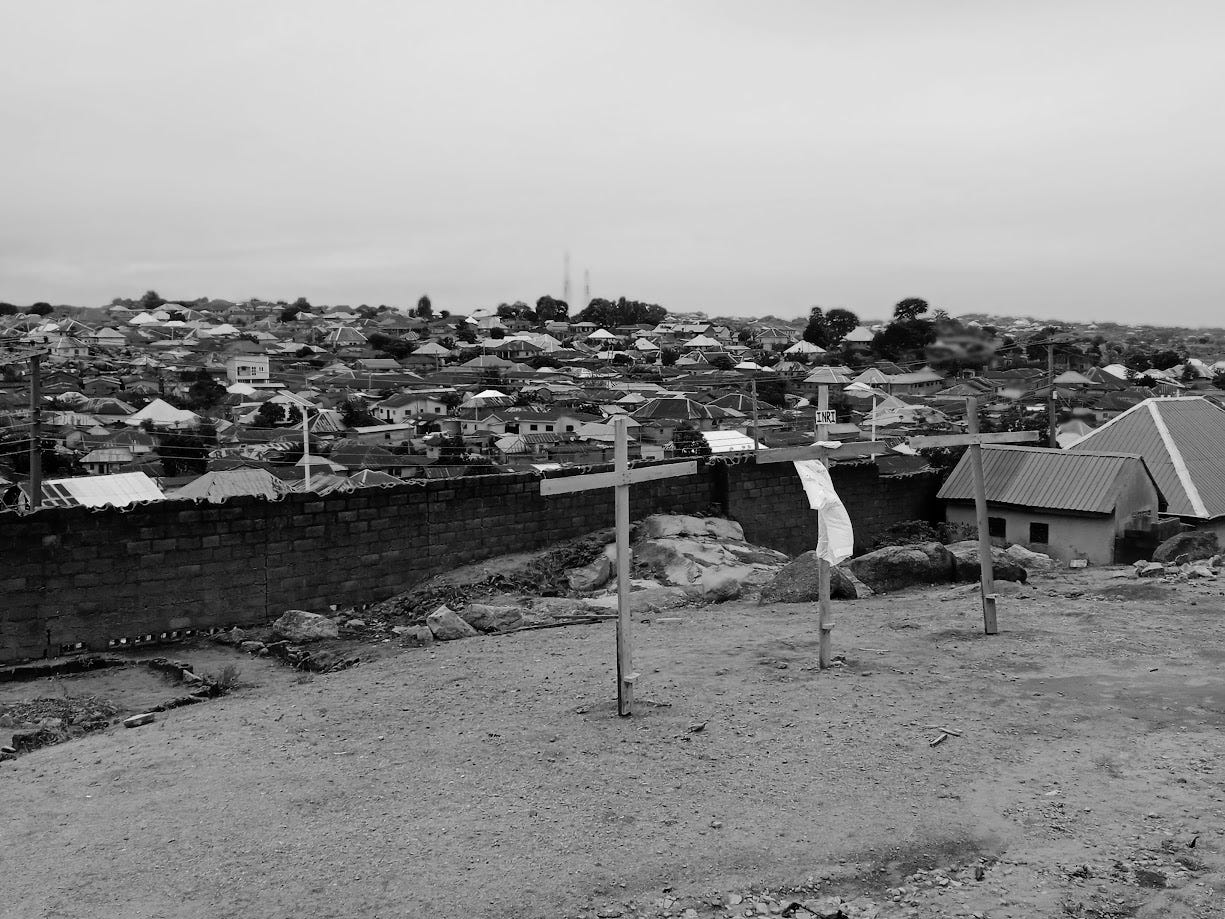I am caught between writing a sequel to What You Can Carry or the subject I had originally planned for today’s letter. But since I’m already here, fingers poised over my keyboard, let’s go with the latter.
Have you seen an aerial photograph recently? They always look like masterpieces, whether a drone shot of Makoko, the floating slum in Lagos, or a panoramic view of a community nestled in the hills. From above or at a distance, everything looks perfect. Orderly. Picturesque.
I don’t know about you, but I always pick the window seat when I check in for flights. And at least once during the journey, I press my forehead against the cool glass, taking in the sheer beauty of creation. The roads, rivers, and rooftops look like pieces of an artist’s grand design. Even on road trips, passing through Jos-Riyom or Mangu-Shendam in central Nigeria, the landscape unfolds like a carefully painted canvas; the grass neatly arranged in rows, the rocks standing majestic in the distance.
It’s breathtaking. But it’s also deceptive.
Because the truth about a place is not always visible from above or a distance, Makoko, from a drone camera’s perspective, is an intricate maze of houses floating serenely on water. But step into the community, and you’ll see the struggle, families living in houses on stilts, children navigating murky waters in makeshift canoes, the air thick with the scent of survival. The same applies to places that look peaceful from afar but, on closer inspection, carry stories of pain, neglect, and endurance.

Pause. I have a socio-political hot take: Many African leaders seem detached from the real struggles of their people. They look at things from an aerial view, where everything appears fine, forgetting that the truth is on the ground. But this isn’t just about leadership. It’s about all of us.
How often do we do the same thing in our own lives?
How often do we judge situations from a distance, assuming we understand them without stepping in for a closer look? We see a friend withdrawing and label them “cold,” without considering the weight they might be carrying. We scroll past a news story about displacement or conflict, moved for a moment but detached from its human cost. We hear of someone’s success and assume they had it easy, not knowing the battles they fought behind the scenes.
Even in our lives, we take an aerial view—seeing only the chaos, the things that haven’t worked out, the problems stacked like an unending to-do list. But if we zoomed in, we might notice the ‘small victories.’ The prayers that have been answered, even if in unexpected ways. The moments of joy in between the struggles. The people who show up for us, even in the quietest ways.
And that’s why the framework of finding God in the ordinariness of everyday life, the very idea that birthed Eavesdrop, is so important. It forces you to slow down, to pay attention. To stop rushing past the details in search of something grander, and instead, to find meaning in what is already here. The familiar, the mundane, the overlooked—this is where God often speaks the loudest.
Perspective is tricky. From a distance, everything looks manageable, or in some cases, worse than it really is. But the details—the truth—reveal themselves up close. That’s why relationships suffer when we assume instead of asking, why hope fades when we fixate on the big picture instead of the small steps forward, and why we sometimes feel stuck when, in reality, we’re still moving.
The Bible reminds us in John 7:24, “Do not judge by appearances, but judge with right judgment.” It’s an invitation to come closer. To stop looking from afar and actually see—ourselves, others, and life—more clearly.
Maybe today is the day to stop looking from a distance. Perhaps it’s time to get closer.
🍿 Things that I have enjoyed recently:
I worked intensely over the last two months, especially while my manager was on leave. When she returned, she suggested I take a week off, outside my annual leave, to rest (God bless her). I didn’t realise how much I needed it until it began. Spending time in a peaceful environment away from home, surrounded by nature, good conversations, great food, and uninterrupted sleep, was exactly what I needed to recharge.
This week, I got hooked on Adolescence, the latest British crime drama on Netflix. As a young person navigating adulthood, and a bit of parenting, the film’s conversations deeply resonated with me, especially in how they highlight the internet’s growing influence on shaping society.
I haven’t watched the What Now? interview with Chimamanda Adichie and Trevor Noah yet, but I’m certain I’ll love it. It’s at the top of my watchlist this weekend




My cousin recommended Adolescence, but I haven't watched yet....
And the What Now? interview is downloade on YouTube. I haven't had the chance to watch.
Aerial views are quite beautiful, but can be deceptive. Thanks for making this clear
The third paragraph painted a vivid picture; it felt like I was sitting next to you on those flights. LOL.
There are things you didn’t know you needed to read, and this is one of them for me. Thank you, sir.